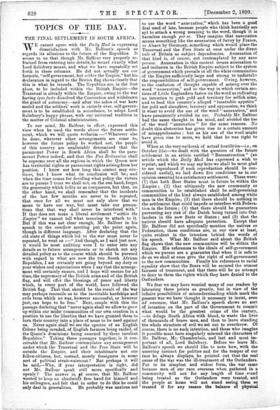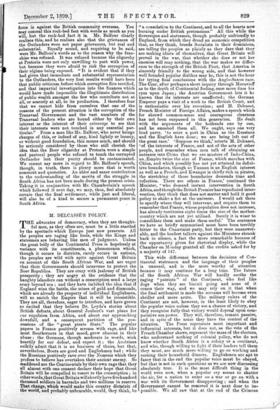TOPICS OF THE DAY.
THE FINAL SETTLEMENT IN SOUTH AFRICA.
WE cannot agree with the Daily Mail in expressing dissatisfaction with Mr. Balfour's speech as regards its allusions to the future of the Republics. It seems to us that though Mr. Balfour very properly re- frained from entering into details, he meant exactly what Lord Salisbury meant, and what we have repeatedly set forth in these columns. He did not actually use our formula, "self-government, but within the Empire," but his declaration in regard to the British flag shows clearly that this is what he intends. The Republics are, in the first place, to be included within the British Empire—the Transvaal is already within the Empire, owing to the war having ipso facto dissolved the Convention aud withdrawn the grant of antonomv—and after the ashes of war have cooled and the soldiers' work is entirely over, self-govern- ment is to be established in accordance, to adopt Lord Salisbury's happy phrase, with our universal tradition in the matter of Colonial administration.
To our mind, Mr. Balfour, in effect, expressed this view when he used the words about the future settle- ment, which we will quote verbatim :—" Whatever else be done, whatever other arrangements are come to, however the future policy be worked out, the people of this country are unalterably determined that the paramount Power in South Africa shall be the para- mount Power indeed, and that the Pax Britannica shall be supreme over all the regions in which the Queen now has territorial rights or paramount rights arising from her position. I know not how long this contest may con- tinue, but I know what its conclusion will be; and when the time comes for deciding what policy the victors are to pursue I trust we shall net, on the one hand, forget the generosity which befits us as conquerors, but that, on the other hand, we shall . remember that the incidents of the last few months are never to be repeated, that once for all we must not only show that we mean to have our way, but must take our precau- tions that that way shall never be interfered with." If that does not mean a liberal settlement "within. the Empire" we cannot tell what meaning to attach to it. But if this was not clear enough, Mr. Balfour in his speech to the overflow meeting put the point again, though in different language. After declaring that the old state of things which led to the war must never be repeated, he went on :—" And though, as I said just now, it would be most unfitting were I to enter into any details as to future arrangements or to sketch out any detailed policy as to the course which should be pursued with regard to what are now the two South African Republics, I am certainly not going beyond my duty or your wishes and expectations when I say that the arrange- ment will certainly ensure, and I hope will ensure for all time, the supremacy of the British arms and of the British flag, and will offer the blessings of peace and liberty which, in every part of the world, have followed the British flag. That that should be the result of the 'war may perhaps reconcile us to the inevitable hardships and evils from which no war, however successful, or however just, can hope to be free." Next, couple with this the passage declaring that "never again shall we allow to grow up within our midst communities of our own creation in a position to use the liberties that we have granted them to turn their country into a place of arms to be used against us. Never again shall we see the spectre of an English Colony being invaded, of English farmers being raided, of the Queen's dominions being annexed by these insolent Republics." Taking these passages together, is it con- ceivable that Mr. Balfour contemplates any arrangement under which the Transvaal and the Free State will be outside the Empire, and their inhabitants not our fellow-eitizens, but, instead, merely foreigners in some sort of political strait-waistcoat ? But perhaps it will be said,—Why, if your interpretation is right, did not Mr. Balfour speak still more specifically and openly ? The answer is, If course, that Mr. Balfour wanted to keep an absolutery free hand for himself and his colleagues, and felt that in order to do this he could only deal in generalities. He probably was anxious not to use the word "annexation," which has been a good deal used of late, because people who think hurriedly are apt to attach a wrong meaning to the word, though it is harmless enough per ee. They imagine that annexation means something like the annexation of Savoy by France, or Alsace by Germany, something which would place the Transvaal and the Free State at once under the direct rule of Britain as subject dependencies. Annexation of that kind is, of course, not contemplated by any sane person. Annexation in this context means annexation to and inclusion in the British Empire subject to the system of government which prevails in all the white communities of the Empire sufficiently large and strong to undertake the responsibilities of self-government. Owing, however, to the confusion of thought capable of arising over the word "annexation," and to the way in which certain sec- tions of Little Englanders fasten on the word as indicating an intention to grab gold and territory for selfish aims, and to feed this country's alleged "insatiable appetite" for gold and slaughter, territory and oppression, we think it wiser to avoid the use of the word " annexation," and have persistently avoided its use. Probably Mr. Balfour bad the same thought in his mind, and avoided the Use of the word " annexation " for the same reasons. No doubt this abstention has given rise to a certain amount of misapprehension ; but as his use of the word might have given rise to more, we hold that he was right to avoid it.
When at the very outbreak of actual hostilities—i.e., on October 21st—we dealt with the question of the future settlement in an article entitled "Reconstruction" (an article which the Daily Mail has expressed a wish to reprint, and which we may say here we shall be most glad to see reproduced if such reproduction should be con- sidered useful), we laid down five conditions as in our opinion essential to a satisfactory settlement. These were: (1) that both Boer States must in future be within the Empire ; (2) that ultimately the new community or communities to be established shall be self-governing communities of the kind always established among white men in the Empire; (3) that there should be nothing in the settlement that could impede or interfere with Federa- tion in the future ; (4) that there should be guarantees preventing any risk of the Dutch being turned into Out- landers in the new State or States ; and (5) that the natives should have adequate protection. Except that Mr. Balfour did not specifically mention the natives or Federation, these conditions are, in our view at least, quite evident in the intention behind the words of his speech. What Mr. Balfour said about the British flag shows that the new communities will be Within the Empire. His references to the ideals of self-government which we pursue are a guarantee that when it is safe to do so we shall at once give the right of self-government to the new communities. Finally his references to racial equality show that the Boers will be secured the utmost fairness of treatment, and that there will be no attempt to deny to them the rights which they have denied to the Outlanders.
We fear we may have wearied many of our readers by labouring these points so greatly, but in view of the infinite possibilities of misunderstanding which mark the present war we have thought it necessary to insist, even ad nauseam, that Mr. Balfour's speech shows no sort of intention on the part of the Government to commit what would be the greatest crime of the century, —to deluge South Africa with blood, to waste the lives of thousands of brave men, and then to leave standing the whole structure of evil we set out to overthrow. Of course, there is no such intention, and those who imagine it possible must have singularly misread the characters of Mr. Balfour, Mr. Chamberlain, and last and most im- portant of all, Lord Salisbury. Before we leave Mr. Balfour's speech we should like to note how, with the unerring instinct for politics and for the temper of our race he always displays, he pointed out that the real cause of the war was the ill-treatment of the Outlanders. Put in its simplest and widest form, the war came because men of our race overseas when gathered in a community will not for any length of time stand being treated as the Outlanders were treated, and the people at home will not stand seeing them so treated if for any reason the balance of physical force is against the British community overseas. You may conceal this rock-bed fact with words as much as you will, but the rock-bed fact it is. Mr. Balfour clearly realises this, and he realises also that the grievances of the Outlanders were not paper grievances, but real and substantial. Equally sound, and requiring to be said, were Mr. Balfour's words as to the reason why the fran- chise was refused. It was refused because the oligarchy at Pretoria were not only unwilling to part with power, but because they were afraid to risk the corruption of their regime being exposed. "It is evident that if they had given that immediate and substantial representation to the Outlanders, the very first results would have been that public criticism before which corruption flies terrified, and that impartial investigation into the finances which would have made impossible the illegitimate distribution of public wealth amongst the few who contribute not at all, or scarcely at all, to its production. I therefore fear that we cannot hide from ourselves that one of the reasons of the present situation is the corruption of the Transvaal Government and the vast numbers of the Transvaal leaders who are bound either by their own interest or the interest of their entourage to see that their interests were not touched in any essential par- ticular." From a man like Mr. Balfour, who never brings charges of this, or indeed of any, kind lightly or loosely, or without good foundation, this means much, and should be seriously considered by those who still cherish the idea that. the Boer oligarchy at Pretoria were a simple and pastoral people who refused to touch the corrupted Outlander lest their purity should be contaminated. We cannot say more in regard to Mr. Balfour's speech, though, in truth, there is plenty more that is worth comment and quotation. An abler and saner contribution to the understanding of the merits, of the struggle in South Africa has not been made during the present crisis. Taking it in conjunction with Mr. Chamberlain's speech which followed it next day, we may, then, feel absolutely certain that the final settlement, while just and liberal, will also be of a kind to secure a permanent peace in South Africa.























































 Previous page
Previous page